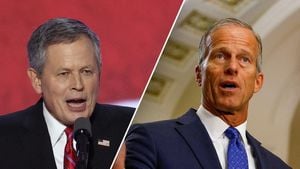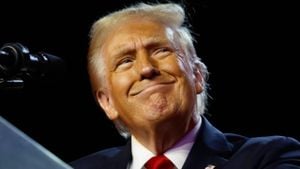After years spent dominating the headlines, Donald Trump returned to the White House, winning election to the presidency once again—this time amid controversies and legal challenges surrounding his past actions. His election raises significant questions about the intersection of law, politics, and ethics, especially since he is currently facing criminal convictions. With the dust barely settling over his victory, let's dissect the ramifications of Trump’s re-election.
The atmosphere surrounding Trump’s latest campaign was marked by his controversial past. He had been convicted of 34 felony counts related to falsifying business records—namely, payments made during his 2016 presidential campaign to silence allegations of an extramarital affair. This conviction was not just incidental; it became entwined with his political fortunes as he campaigned for the presidency. Judge Juan M. Merchan, overseeing the case, found himself grappling with how to proceed now, as Trump’s win complicates the traditional relationships between the judicial and electoral branches of government.
What exactly could happen with Trump’s legal troubles now as he assumes office? Merchan has indicated he’ll wait a few days—likely until November 19—to determine how to move forward. He tentatively scheduled Trump’s sentencing for November 26, putting everyone on notice: What does the future hold for this president-elect with multiple legal entanglements? Trump's lawyers wish to have the charges overturned altogether, arguing, based on recent Supreme Court precedents, he is shielded from prosecution for actions taken during his presidency—an argument open to incendiary interpretation.
Adding yet another layer to this already complicated scenario, some legal experts posit Merchan might defer sentencing until Trump steps down from office, potentially leaving the case unresolved until 2029! At 82 years old, Trump would then be significantly removed from the events he’s currently tied to. But beneath the surface, the ramifications of this legal status could significantly impact how he governs and enforces his policies. Would he prioritize legislation to benefit the interests of his allies and his businesses over ethical governance? Historically, Trump has navigated such complex waters with dubious results.
The notion of Trump returning to office, even as he's embroiled in criminal investigations, leaves many Americans aghast. His combination of legal missteps and electoral victories could symbolize—some would argue exacerbate—a fundamental disconnect between the will of the people and adherence to the rule of law. Critics argue this undermines the integrity of not just Trump’s presidency, but the democratic system itself, which fundamentally relies on accountability and transparency.
For some voters, Trump's policies have continued to resonate, particularly those focusing on economic issues such as inflation and unemployment. Indeed, many of his supporters emphasized their immediate financial struggles – rising grocery prices and job security. The emotional appeal of ‘Make America Great Again’ still motivates these voters to overlook the troubling facets of his history. Ironically, polls indicate both dissatisfaction with his past actions and hope for future economic progress under his leadership.
Yet, the divisive aspects of his presidency haven’t disappeared. Trump has consistently employed rhetoric positioning himself against perceived enemies—be it political foes or the judicial system—which only serves to stoke confrontation. During his pre-election rallies, he invoked language filled with hostility, including threats against former political opponents and prominent figures within his own party.
Among the most notable counsels is the choice of Matt Gaetz, the staunch Trump loyalist, as Trump’s pick for attorney general. Gaetz's confirmation will likely usher in tumultuous debates surrounding trustworthiness, accountability, and the enforcement of laws—particularly if he aligns closely with Trump’s maneuvers. His past conduct raises eyebrows as many fear it could translate to the Attorney General’s office bypassing issues of legality for political gain.
A key theme running through the coverage of Trump’s current predicament revolves around the interpretation of justice and morality within political offices. The outrage from individuals witnessing Trump's repeated perceived misconduct and failures to address ethical concerns has sparked difficult discussions about the nature of leadership—challenges compounded by the actions of fellow elected officials willing to overlook such behavior for political expediency.
Those invested in the legal consequences of Trump's alleged misconduct note the stark lack of democratic principles echoing through these events. Even as he retains significant popular support, questions concerning fairness and ethics highlight the fractures within America’s political canvas. A nation noted for its commitment to laws and societal contracts now confronts the stark portrayal of its institutions being wrested away for political gain.
For non-supporters, this election result felt all too familiar; the continued support for Trump from Republican voters speaks volumes about their prioritization of tribalism over ethical governance. Consequently, it raises the discomforting question: Are they willing to trade principles for expediency? What does this mean for America’s future? Such queries seem to merge many different perspectives, simultaneously reflecting hope, fear, skepticism, and determination.
Going forward, the coming weeks leading up to Trump's inauguration are likely to rev up the anticipatory discourse surrounding both his administration and looming legal matters. Should Merchan proceed with sentencing, it could provide clarity on how the rule of law will hold up against the executive power. Or, if he cicadas Trump's prior convictions, it could set troubling precedents where legal issues can be nullified by mere popular support. This potential divergence draws attention to broader questions around the ties binding political authority with accountability.
Amidst these gripping narratives, let’s not overlook the gravity of Trump's re-election—a legacy steeped not only with unprecedented achievements but also hindered by contentious pasts. Whether he emerges as the president unencumbered by legal repercussions or someone facing substantial ramifications could shape the future of American governance—and perhaps democracy itself. Whatever the outcome, the conversations we have moving forward will undoubtedly illuminate the essence of our times—what does it truly mean to uphold democratic values.



